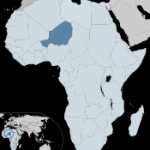List of Publications, 2011-2012 by the Canadian Association of African Studies’ members
 This list is based upon information supplied by CAAS members in response to an invitation by CAAS. It is not necessarily a comprehensive list of all publications by all members.
This list is based upon information supplied by CAAS members in response to an invitation by CAAS. It is not necessarily a comprehensive list of all publications by all members.
Campbell , Gwyn (2012) “Slave Trades and Slavery in the Indian Ocean” in Abdul Sheriff and Engseng Ho (eds.), The Indian Ocean: Oceanic Connections & Creation of New Societies (London: Hurst)
Campbell , Gwyn (2012) “Servitude and the Changing Face of Demand for Labour in the Indian Ocean World, c.1800-1900” in Bob Harms and Bernard Freamon (eds.), Slavery and the Slave Trades in the Indian Ocean World: Global Connections and Disconnections (New Haven, CT: Yale University Press)
Campbell , Gwyn (2012) “The Concept of “Homeland” for African Slaves in the Indian Ocean World” in Chouki El Hamel and Paul Lovejoy, eds., Confluence of Cultures or Convergence of Diasporas (Red Sea Press)
Campbell , Gwyn (2012) “Thomas Phillips’ Dream and the Founding of the Madagascar Mission,” Trivium
Campbell , Gwyn (2012) David Griffiths and the Missionary ‘History of Madagascar’ (Leiden: Brill)
Campbell , Gwyn (2012) “Female Bondage and Agency in the Indian Ocean World” in Ehud R. Toledano (ed.), African Communitiesin Asia and the Mediterranean: Identities between Integration and Conflict (Trenton, NJ; Africa World Press): 37-63
Campbell , Gwyn (2011) Co-Editor (with Suzanne Miers and Joseph Miller), Child Slaves in the Modern World. (Athens OH: Ohio University Press)
Campbell , Gwyn (2011) “Children and Bondage in Imperial Madagascar, ca.1790-1895,” in Gwyn Campbell, Suzanne Miers and Joseph Miller (eds.), Child Slaves in the Modern World. (Athens OH: Ohio University Press): 37-63
Campbell , Gwyn (2011) “Africa, the Indian Ocean World and the “early modern”: Historiographical Conventions and Problems” in Toyin Falola and Emily Brownell (eds.), Globalization. Essays in Honour of Anthony Hopkins (Durham N.C.: Carolina Academic Press): 81-92
Campbell , Gwyn (2011) “Slavery in the Indian Ocean World,” in Gad Heuman and Trevor Burnard (eds.), The Routledge History of Slavery (London: Routledge): 52-63
Cisse, Blondin (forthcoming) »L’espace public ou le lieu de construction déconstructive » Sens Public
Cisse, Blondin (forthcoming) « Renaissance africaine et Consciencisme » Présence africaine.
Cobbett, Elizabeth (2011). The Shaping of Islamic Finance in South Africa: Public Islam and Muslim Publics.” Journal of Islamic Studies, 31, 29-59.
Islamic finance is an inescapable component of the current global political economy. As this young industry deepens and expands, there is a corresponding recognition that faith-based economic practices offer considerable potential for growth. The acknowledged resilience of Islamic banks during the last global financial crisis further serves to underpin the perception that this market can be an interesting and viable alternative to conventional finance. Moreover, estimates calculate that Islamic financial institutions are serving less than five percent of the world’s Muslim population. Yet, as banks and financial institutions enter this niche market they are facing the realisation that there is no simple equation between being Muslim and using Islamic financial instruments. It is not because a Muslim is devout that he or she will switch to using Shariah compliant financial products.
This article argues that everyday actions at the intersection of religion and the economy are culturally and historically contextual and that this will shape the development of Islamic finance worldwide. This suggests that Islamic finance, presented as a set of financial products, is shaped by dynamic interpretations of Islam as they are expressed spatially and contextually. This is demonstrated in the case of South Africa’s Muslim communities. Financial institutions are participating in the construction of Islam as they develop Islamic financial products and services, inculcating Muslims with the idea that faith-based services are an essential component of their lives as devotees. But South African Muslims are responding to these projections of Islam in an array of ways that does not necessarily promote the institutionalisation of Islamic finance. I engage with the work of Abdullah Tayob, a leading scholar of Islam within South Africa. Tayob presents the idea of ‘Public Islam’ and ‘Muslim Publics’ as discursive spaces that construct Islam in the public sphere and society. Public Islam refers to highly diverse innovations of Islam as ideas and practices. Actors from divergent backgrounds compete to define Islam for new and changing political spaces. Debating within this broader discursive space, the situated, communitarian and political aspects of these discourses are conceived of as ‘Muslim Publics.’ Islamic finance is both Public Islam, as Shariah compliant financial products are introduced into the market and contribute to the construction of Islam in the public sphere, and Muslim Publics, as Muslims debate the meaning of these financial products in their lives.
Cordell, Dennis D. (2012) The Human Tradition in Modern Africa. Boulder: Rowman and Littlefield, Editor, author of the introduction, and co-author of a chapter.
Cordell, Dennis D. (forthcoming), “Interdependence and Convergence: Migration, Men, Women, and Work in Sub-Saharan Africa, 1800-1975,” in Proletarian and gendered mass migrations: A global perspective on continuities and discontinuities from the 19th to the 21st centuries, Dirk Hoerder and Amarjit Kaur (editors). Leiden Brill Publishers (Studies in Global Social History Series, edited by Marcel van der Linden). In press.
Cordell, Dennis D. (2012) “Introduction: People and History in Modern Africa,” in The Human Tradition in Modern Africa, Dennis D. Cordell (editor). Boulder: Rowman and Littlefield, 2012, 1-9.
Cordell, Dennis D. and Carolyn Sargent (2012), “Samba Sylla (1948), Doulo Fofanna (b, 1947 or 1948), and Djenébou Traoré (b. 1972): The Colonies Come to France,” in The Human Tradition in Modern Africa, Dennis D. Cordell (editor). Boulder: Rowman and Littlefield, 2012, 249-266. .
The complete list is available at the following link: CAAS members publications 2011-2012
53 Doctoral Scholarships in Computer Science at the University of Trento (Italy) Association Canadienne des Études Africaines: le programme du congrès annuel 2012
Comments are currently closed.